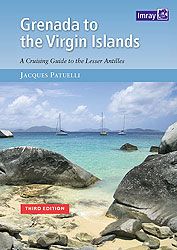| |
|

The island was occupied by the Arawaks
about two thousand years ago, and then
by the Caribs. The latter called
Guadeloupe (pronounced Gwa-d’loop)
Karukera, which means ‘island of lovely
waters’. Columbus discovered it on 4
November 1493 and named it after a
Spanish monastery, Our Lady of
Guadalupa de Estramadura. It was
colonised in 1635 by Duplessis
d’Ossonville and Lienard d’Olive,
Frenchmen from St Christopher, or St
Kitts as everyone now calls it. Less well
governed than Martinique, Guadeloupe
was taken over by the English in 1759.

|
|
|
|
The first town founded by the French,
Basse Terre, had meanwhile prospered.
But the English founded a second,
Pointe-à-Pitre, which takes its name from
a Dutchman called Peter, hence Peter’s
Point. The Treaty of Paris of 1763
returned Guadeloupe to the French, only
for it to be taken away again by the
English in 1794 and then immediately
recaptured by the revolutionary
commissar of the new Republic, Victor
Hugues. In order to enforce the
revolutionary government’s decrees and
the abolition of slavery, he organised the
‘Terror’ against the planters and
aristocrats. In 1802, Napoleon
Bonaparte re-instituted slavery, which
was not finally abolished until 1848.
With Bonaparte’s rise to power some of
the exiled planters returned to the island,
but Guadeloupe’s Creoles never regained
their former power. That had an effect on
land ownership, whereby the majority of
agricultural holdings were bought and
consolidated by large companies from
metropolitan France.
 A department of France since 1946,
the economy of Guadeloupe is tightly
tied to the metropolitan power, most
significantly in terms of the size of the
governmental machine and the large
number of public sector employees it has created. Guadeloupe’s absorption into
France proper as one of the departments
sending deputies to the French national
assembly has some undoubted economic
advantages, but has not resolved all of
Guadeloupe’s problems. Agriculture
(mainly bananas and sugar) is relatively
speaking a declining industry, but even so
it remains economically important
thanks to international demand and farm
support policies. That said, after direct
subsidies from France, tourism is now
the island’s economic mainstay. A department of France since 1946,
the economy of Guadeloupe is tightly
tied to the metropolitan power, most
significantly in terms of the size of the
governmental machine and the large
number of public sector employees it has created. Guadeloupe’s absorption into
France proper as one of the departments
sending deputies to the French national
assembly has some undoubted economic
advantages, but has not resolved all of
Guadeloupe’s problems. Agriculture
(mainly bananas and sugar) is relatively
speaking a declining industry, but even so
it remains economically important
thanks to international demand and farm
support policies. That said, after direct
subsidies from France, tourism is now
the island’s economic mainstay.
|
|
|








